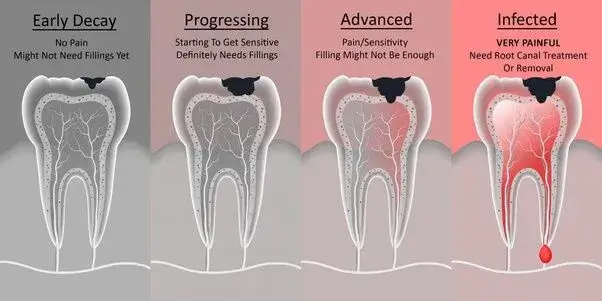Can You Reverse Tooth Decay Naturally?
Tooth Decay Naturally is among the most widespread dental issues affecting both children and adults. With the growing interest in natural health solutions, many people ask whether it’s possible to reverse tooth decay naturally. The answer depends on the stage of the decay. In its earliest stages, tooth decay can be halted or even reversed using natural methods like dietary changes, oral hygiene improvements, and remineralization strategies. However, once a cavity has formed, professional dental care becomes necessary read more.


Understanding Tooth Decay and Its Early Stages
Tooth decay begins when bacteria in the mouth produce acids that erode the tooth enamel. This acid production is typically triggered by consuming sugary or starchy foods. Without proper cleaning, bacteria thrive and form plaque—a sticky biofilm that clings to teeth and increases the risk of demineralization. At the very early stage, the enamel begins to lose essential minerals like calcium and phosphate. This is known as demineralization, and it can present as chalky white spots on the teeth.
At this stage, it’s still possible to remineralize teeth and prevent cavities. But if left unchecked, the decay progresses to deeper layers such as the dentin and eventually the pulp, causing pain, infection, and ultimately tooth loss.
Natural Ways to Reverse Tooth Decay at an Early Stage
The most effective way to treat tooth decay naturally is to focus on remineralizing the enamel. This process involves restoring lost minerals to the tooth surface, thus hardening the enamel again and halting the decay process.
The Role of Diet in Tooth Remineralization
A nutrient-rich diet is essential in fighting early cavities and strengthening enamel naturally. Foods high in calcium, like cheese, yogurt, and leafy greens, help reinforce tooth enamel. Phosphorus-rich foods such as nuts, fish, and eggs also contribute to enamel strength. Vitamin D, found in fatty fish and sunlight, improves calcium absorption, playing a key role in maintaining strong teeth.
Equally important is reducing the intake of sugary and acidic foods. Sweets, sodas, and processed snacks feed harmful bacteria that produce decay-causing acids. Eating crunchy vegetables and drinking plenty of water can also help in maintaining a cleaner mouth and promoting saliva flow.
Fluoride and Remineralization: Natural or Necessary?
While not strictly a “natural” remedy, fluoride treatment is highly effective in preventing and even reversing early decay. Fluoride toothpaste and mouth rinses work by aiding the remineralization process, helping teeth rebuild lost enamel. Even natural brands now offer fluoride-based solutions for people focused on health but not willing to sacrifice dental protection.
Saliva: The Natural Tooth Defender
Saliva is your body’s first defense against tooth decay. It neutralizes harmful acids, cleans food debris, and delivers essential minerals like calcium and phosphate back to the teeth. Staying hydrated and stimulating saliva flow through sugar-free gum, particularly those with xylitol, can aid in preventing cavities naturally. Saliva plays a vital role in supporting overall oral health and should not be overlooked in a natural tooth decay treatment plan.
Natural Remedies Worth Considering
Beyond diet and fluoride, some people turn to holistic solutions. Oil pulling, an ancient practice using coconut oil, is believed to reduce harmful bacteria in the mouth. Though scientific evidence is limited, it is widely practiced for its potential antibacterial effects. Clove oil, known for its numbing and antiseptic properties, is another natural remedy often used for minor tooth pain and early gum issues.
While these remedies can be supportive, they should be used in conjunction with—not in place of—brushing, flossing, and routine dental care.
How to Prevent Tooth Decay Naturally Over Time
Preventing decay is more effective than treating it, whether naturally or professionally. Good oral hygiene remains the foundation: brushing twice daily with remineralization toothpaste, flossing, and regular dental check-ups are essential. Eating a balanced diet and avoiding snacking throughout the day will help keep bacteria at bay. For those interested in more natural care, herbal mouth rinses, mineral pastes, and probiotic lozenges may also support a healthy oral microbiome.
When Natural Methods Aren’t Enough
It’s important to know the limits of natural methods. Once decay progresses past enamel demineralization and a cavity forms, it cannot be reversed with diet or oil pulling alone. At this stage, a dental filling or other professional treatment becomes necessary. Ignoring the symptoms can lead to infection, abscesses, and tooth loss.
Conclusion
Yes, you can reverse tooth decay naturally—but only if it’s caught early enough, during the demineralization stage. The key is maintaining a mineral-rich diet, using fluoride treatment or alternatives, stimulating saliva production, and practicing consistent oral hygiene. While natural remedies like oil pulling and xylitol gum can support your efforts, they should complement—not replace—professional care. When in doubt, always consult a dentist to determine whether your tooth decay is still reversible or requires clinical treatment. With proper attention and proactive habits, keeping your teeth strong and healthy is absolutely achievable dicover more.
